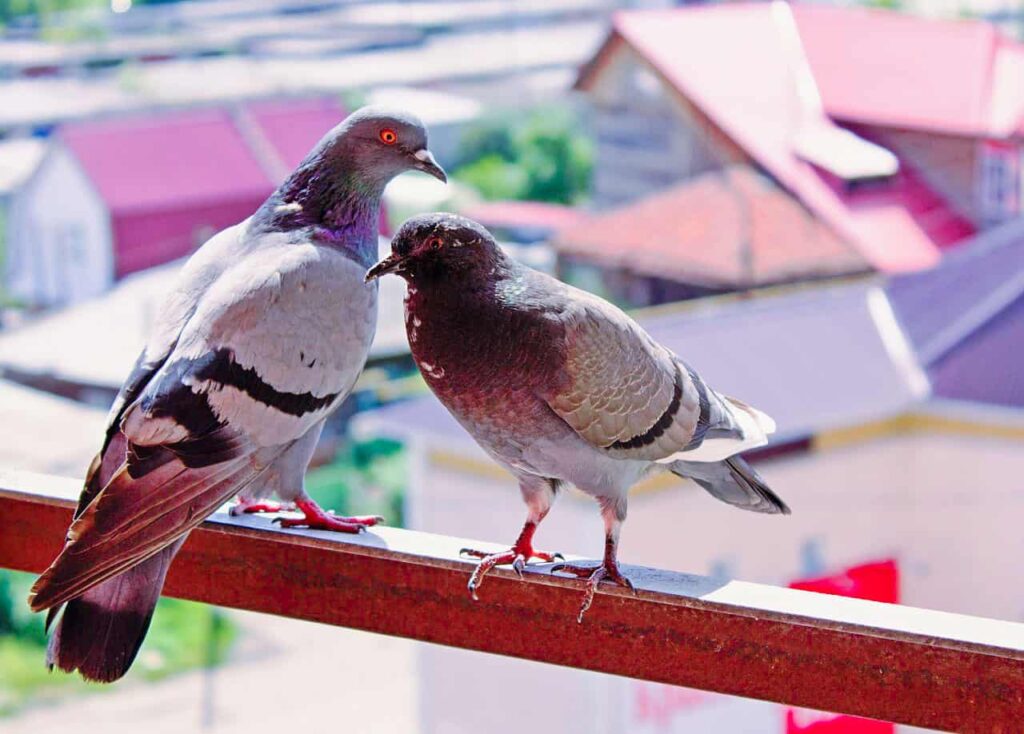How To Keep Pigeons Away From My Balcony

Pigeons, with their persistent presence and penchant for nesting in urban environments, can pose a nuisance for balcony owners. Dealing with pigeon infestations requires a strategic approach that balances effectiveness with ethical considerations. In this article, we explore various methods and techniques to keep pigeons away from your balcony while maintaining a humane approach to pest management.
I. Introduction
A. Understanding the Challenge of Pigeon Infestation Pigeons are highly adaptable birds that thrive in urban settings, where they find abundant food sources and sheltered roosting spots. Balconies provide an ideal habitat for pigeons to nest and roost, posing sanitation issues and potential health risks for residents.
B. Importance of Humane Methods for Deterrence While pigeons may be considered pests, it’s essential to approach their management with compassion and respect for their welfare. Employing humane methods ensures that pigeons are deterred without causing harm or suffering.
C. Overview of Strategies to Keep Pigeons Away Effective pigeon deterrent strategies encompass a range of approaches, including physical barriers, repellents, cleanliness maintenance, and seeking professional assistance. By implementing a combination of these methods, balcony owners can successfully discourage pigeon infestations.
II. Creating Physical Barriers
A. Installing Spikes or Bird Netting Spikes and bird netting are commonly used physical barriers to prevent pigeons from landing and nesting on balconies. These deterrents create an inhospitable environment for pigeons without causing harm to the birds.
B. Using Visual Deterrents such as Reflective Objects Visual deterrents, such as reflective objects or shiny tape, exploit pigeons’ aversion to bright lights and movement. Placing these items strategically on the balcony can deter pigeons by creating visual disturbances that make them feel uneasy.
C. Implementing Physical Obstacles like Sloped Surfaces Sloping surfaces or angled ledges can make it difficult for pigeons to perch and roost on balconies. By modifying the architecture of the balcony to prevent flat surfaces, balcony owners can discourage pigeons from lingering in the area.
III. Employing Repellents and Scare Tactics
A. Utilizing Natural Repellents like Citrus or Chili Pepper Natural repellents, such as citrus sprays or chili pepper solutions, can be sprayed onto balcony surfaces to deter pigeons. The strong odors and flavors of these substances are unpleasant to pigeons, discouraging them from returning to the area.
B. Setting Up Ultrasonic Devices or Motion-Activated Sprinklers Ultrasonic devices emit high-frequency sound waves that are undetectable to humans but irritating to pigeons, prompting them to leave the area. Motion-activated sprinklers startle pigeons with sudden bursts of water, effectively deterring them from roosting on balconies.
C. Deploying Decoys or Predator Models to Scare Pigeons Away Decoys or predator models, such as fake owls or hawks, can be placed on balconies to mimic natural predators and intimidate pigeons. The presence of these decoys creates a sense of danger for pigeons, encouraging them to avoid the area.
IV. Maintaining Cleanliness and Removing Attractions
A. Regularly Cleaning Balcony Surfaces and Removing Food Sources Pigeons are attracted to balconies with food sources, such as crumbs or spilled birdseed. Regularly cleaning balcony surfaces and removing food debris can eliminate attractants and discourage pigeons from frequenting the area.
B. Sealing Off Potential Nesting Sites and Hiding Spots Pigeons seek out sheltered areas for nesting and roosting, such as vents or alcoves. Sealing off potential nesting sites and hiding spots with wire mesh or blocking access points can prevent pigeons from establishing a presence on balconies.
C. Implementing Habitat Modification to Discourage Roosting Modifying the balcony environment by removing roosting perches or installing deterrent devices can make the area less appealing to pigeons. Creating an open and exposed space reduces the opportunities for pigeons to roost and nest.
V. Seeking Professional Assistance
A. Consulting Pest Control Experts for Effective Solutions In cases of severe pigeon infestations or persistent problems, consulting pest control experts can provide professional guidance and assistance. Pest control professionals can assess the situation and recommend tailored solutions for pigeon management.
B. Exploring Long-Term Strategies for Pigeon Management Long-term pigeon management involves implementing sustainable solutions to prevent future infestations. This may include regular maintenance, ongoing monitoring, and proactive measures to deter pigeons from returning to balconies.
C. Considering Legal and Ethical Considerations in Pigeon Control When implementing pigeon control measures, it’s essential to consider legal and ethical considerations related to wildlife management. Balcony owners should ensure that their chosen methods comply with local regulations and prioritize humane treatment of pigeons.
By implementing a comprehensive approach that combines physical barriers, repellents, cleanliness maintenance, and professional assistance, balcony owners can effectively keep pigeons away from their balconies while upholding ethical standards in pest management. With patience and persistence, a pigeon-free balcony is within reach for every homeowner.



